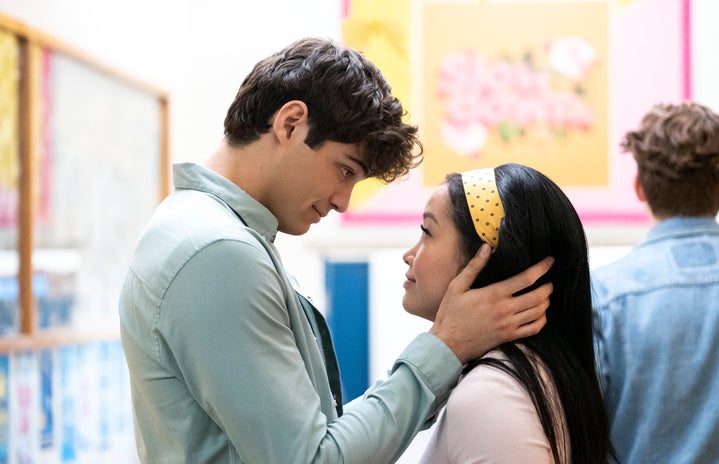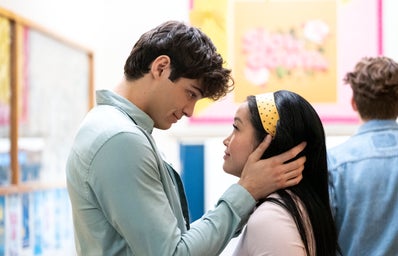If you’ve watched and enjoyed The Kissing Booth, To All The Boys I’ve Loved Before, Sierra Burgess is a Loser, Tall Girl, or any others of the vast number of teen-romance Netflix original movies that are pretty much shot-for-shot remakes of the previously stated films, you might not like what I’m going to say next. Actually, maybe click out of this article. Save yourself. (Please don’t, I worked hard on this).
Or, keep reading. This is your sign. An intervention, if you will. If you’ve watched any of these Netflix originals semi-ironically like I did, and then had to shut your laptop and briefly re-evaluate all of the decisions that you have ever made that led you to this moment, you probably know where this article is leading. If you’re confused as to why I went through an intense period of self-loathing following my viewing of some of these movies, please stick around. You need all the help you can get. Kidding. Kind of.

The thing about these Netflix originals is that they’re actually entertaining. I genuinely get why Netflix has churned so many of these rom-coms out in the past couple of years. They’re strangely addictive to watch.They’re so outrageous that you just can’t help but keep looking, they’re highly romantic– which I know must appeal to a large teenage audience who has not yet been scorned by love (again, mostly kidding here)– and they’re pretty much unavoidable when you log onto Netflix in search of your next pick for movie night. However, their ubiquitousness feels a little scary to me, given just how gigantic their audience is, especially because I know that a lot of these viewers are not taking the content of these movies with the grain of salt that I’m sure even the filmmakers intended there to be. When media is widely consumed and discussed, it can feel as though it’s widely accepted, dragging its content, however problematic, right along with it. The content of these Netflix originals can be dangerous, to say the least, when it targets younger, more impressionable viewers. Thus, the whole “romance” part of the rom-com can easily become ingrained into young people’s ideas about romance in real life (wow, I sound old there). This sets a dangerous precedent for how we view love in our society, particularly within the context of young love, as that’s sort of the whole gist of these movies. These movies portray teenage love in a skewed way, which undoubtedly is morphing how actual teenagers view actual love. In other words, this is no good.
The biggest bone that I have to pick with these movies is that they all seem to cast their protagonists and their love interest(s)– Netflix has a big thing with love triangles, so I don’t want to leave anyone out– into very strict gender roles, often with accompanying stereotypes. These gender roles often take the extremes, painting the female protagonists as sexually inexperienced, book smart, sheltered, and emotionally giving, while their male love interests are sexually experienced, athletic, assertive, and emotionally closed off. These characters are essentially molded within the confines of what’s socially desirable for an attractive woman and man, respectively. The message that Netflix is sending is clear: in an ideal teenage love story, the heterosexual couple must be attractive (I mean, Noah Centineo has been cast in like five of these things) and completely gender conventional. Uh-oh.
It drives me crazy as a viewer to see how each of these love stories unfolds based on these rigidly gendered characteristics of the protagonists. The female leads always seem to have a moment of doubt over their love interests, worrying that the sexual experience of the boys they swoon over will corrupt their well-established total inexperience (which is often what makes them most desirable to said love interests, gross). Just to be clear to any teenage girls watching these movies: your sexual history does not determine how worthy you are of finding picture perfect love! And to teenage boys watching: you do not have to have a lot of experience with girls in order to find the right girl!
The assertiveness and complete lack of ability to emotionally express themselves in the male leads almost always leads to an intense amount of possessiveness and jealousy being taken out on the female leads once their relationship is established. Everyone, this is NOT normal. Healthy relationships rely on mutual trust and open communication. Possessiveness and extreme jealousy are the literal opposite of that. In The Kissing Booth, Noah, the male lead (which just adds to my confusion over the amount of Noah’s involved with Netflix rom-coms), threatens all of the guys at his love interest’s school with physical violence should they ever pursue this girl romantically. He then gets into not one, but two fist fights with men who dare to interact with the girl of his dreams, justifying it every time by claiming that he’s just trying to protect her. All I can say here is just… no. Keep in mind, that’s just a fraction of the overwhelmingly controlling behavior displayed by other-Noah (as in, not Noah Centineo) throughout the course of the four hours worth of Kissing Booth content on Netflix (yes, there is, in fact, an even worse sequel). Noah Centineo’s character in To All the Boys I’ve Loved Before seems like the perfect gentlemen– minus the fact that he was entertaining his ex-girlfriend all while dating main character Lara Jean– until we get to that sequel (which yes, exists as well), during which he displays bouts of jealousy over his girlfriend’s friendship with another guy. Not cool, Noah, not cool. If I were to go through every one of these Netflix teen romances, I’m sure I’d find a similar trend in almost all of them. Portraying controlling behavior, while ultimately ensuring that the man behind this controllingness ends up in a seemingly happy and idealized relationship with the female lead, not only normalizes this form of manipulation, but goes as far as to romanticize it. If these fictional couples are being celebrated by millions of viewers, then they represent what love should be, right?
What’s just as frustrating is how the values of the female leads almost always tend to shift once they end up in a relationship with their crush. These characters, who are exclusively highly studious and thus primarily focused on their grades due to Netflix’s intense desire to create a series of stereotypically innocent and sheltered female leads, are almost never portrayed as focusing on their studies once they enter their relationships. Their devotion to academics and aspiring toward creating a bright future for themselves is pushed to the side in favor of their newfound role as a girlfriend. This is as if to say, “girls, maintain your innocence by avoiding socialization with the opposite sex and keeping your head in a book until you’re chosen for a relationship, then put all that brain power into keeping your man happy.” Essentially, it feels like the admirable characteristics of intelligence and work ethic are only used as tools to suggest a girl’s innocence in these movies, rather than to develop these characters through their roles as bright students. Being a good student and being a good girlfriend are not mutually exclusive! And being a good student is not a euphemism for being shy and not talking to guys– women are multi-dimensional! People in a healthy relationship support each other’s ambitions; if you aren’t able to focus on your own personal successes while still prioritizing your relationship, you shouldn’t be in a relationship. Just saying.
Furthermore, the epic highs and lows behind the unfolding of these highly-gendered teen romances suggest to their viewers that this is what a perfect love-story should look like– volatile, dramatic, and yet still working out in the end. Admittedly, there’s a lot of fun and excitement behind the whole “will they, won’t they” stage of dating. I’m not dismissing that at all– a boring relationship is not what I’m promoting here, guys! The problem that I’m pointing out is that a healthy relationship has to have a certain degree of consistency, which comes from being clear and open with your partner about your relationship. Most of the ups and downs associated with these relationships stem from a jealous ex, a forbidden love, or, in the case of Sierra Burgess is a Loser, genuine catfishing (no joke). All of these instances literally would not have happened had the couples in question sat down to clarify their feelings for one another and their intentions (though in the Sierra Burgess case, maybe sitting down for therapy would be better). If a relationship swings wildly between blissful highs and turbulent lows, chances are that it’s a toxic one. The fact that these highs and lows are quite prevalent across the majority of Netflix teen romances suggests that unhealthy relationships are being further romanticized to teenage audiences.
I’ll end by saying this: Please, please, please do not watch Netflix teen rom-coms and think for one second that they’re reflective of what healthy relationships should look like. I’ll support you unconditionally if these movies bring you joy and you want to continue watching them to your heart’s content. As long as your heart knows that healthy relationships do not fit the gender confines or the toxic dynamics displayed on your screen.






